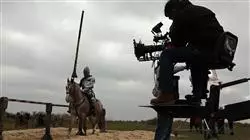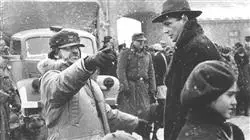University certificate
The world's largest faculty of journalism and communication”
Why study at TECH?
This program will allow you to develop all your knowledge about the character and story creation and translate it into a script for TV and internet series, in a professional way"

The entertainment industry has been evolving rapidly in recent times. Streaming platforms, new content-producing corporations and the latest social trends are bringing about major changes that affect the industry and its professionals. Television series and Internet platforms appear as an opportunity for screenwriters, producers, actors, directors and other entertainment professionals.
Creating a script for a television or Internet series requires different skills that allow the idea to be put into practice and to make it work, from the initial idea and its historical process, to the realization of the script itself. Keeping up to date in this area is necessary, even if scriptwriters' basic skills are extensive and experienced. In addition, it is not only enough to know the fundamentals of the processes that must be carried out for script series creation, but it is also important to incorporate the necessary information for its pre-production, production and post-production, viewing the process as a whole in an integral manner .
The syllabus consists of a first part where the focus is on character construction, the development of the character's evolution and different techniques. The second part is clearly differentiated from the first: in this part we delve into the history of cinema and, more importantly, television. Finally, in the third part of this syllabus, we will find the different formats of series that exist, both for television and the Internet, and their fundamentals.
This program is the most complete and targeted program for professionals in series script creation to reach a higher performance level, based on the fundamentals and the latest trends in audiovisual script development for television or Internet series. Make the most of the opportunity and take this program, 100% online. Get your Postgraduate diploma to continue growing in your screenwriting career.
This program will allow you to enhance your skills and become a professional TV and internet scriptwriter”
This Postgraduate diploma in Scriptwriting for Television and Internet Series contains the most complete and up-to-date program on the market. The most important features include:
- The development of case studies presented by experts in Script for series
- The graphic, schematic, and practical contents with which they are created provide scientific and practical information on the disciplines that are essential for professional practice
- Latest advances in character and story creation, taking into account the latest social trends and advances in multimedia formats
- Practical exercises where the self-assessment process can be carried out to improve learning
- Special emphasis on script creation methodologies in series format
- Algorithm-based interactive learning system for decision-making in the situations that are presented to students in script creation
- Theoretical lessons, questions to the expert, debate forums on controversial topics, and individual reflection assignments
- Content that is accessible from any fixed or portable device with an Internet connection
This Postgraduate diploma is perfect for you to know how to tell the story you want to tell”
It includes professionals belonging to the world of television and internet series production, who pour their work experience into this program, in addition to recognized specialists from leading companies and prestigious universities.
Its multimedia content, developed using the latest educational technology, will enable contextual and situated learning, i.e., a simulated environment that will provide immersive learning programmed to prepare students for real situations.
The design of this program focuses on Problem-Based Learning, by means of which students must try to solve the different professional practice situations that are presented to them. For this reason, students will be assisted by an innovative, interactive video system created by renowned and experienced experts in the field with extensive experience.
Don't miss the opportunity to increase your skills in series script creation in different formats"

Learn about the latest trends in the entertainment industry and update your knowledge in series scriptwriting"
Syllabus
The structure of this contents has been designed by a team of professionals in creating scripts in both television and Internet series format, aware of the relevance of the current relevance of professional development in order to deepen the field of knowledge to produce professional quality scripts using the new tools available.

This Postgraduate diploma contains the most complete and up-to-date program on the academic panorama”
Module 1. Character Building
1.1. An Introduction to the Character
1.1.1. Basic Concepts
1.1.1.1. Historical Origin
1.1.1.2. Character and Narratology
1.1.1.3. Formalist Conceptions
1.1.1.4. Structural Conceptions
1.1.2. Psychology of the Character
1.1.2.1. Flat Characters
1.1.2.2. Round Characters
1.1.2.3. Character Sheet
1.1.2.4. Conflict
1.1.2.5. Objective
1.1.2.6. Motivation
1.1.3. Stocks
1.1.3.1. Cause and Effect Relationship
1.1.3.2. Self-Disclosure
1.1.3.3 New Balance
1.1.4. Practical Example
1.2. Characterization of Characters
1.2.1. Characters and Plot
1.2.1.1. Topics
1.2.1.2. Symbolism
1.2.1.3. Worlds
1.2.1.4. Stocks
1.2.1.5. Interpretation of the Screenwriter's World
1.2.2. Characterization of Physical Appearance
1.2.2.1. Character vs. Person
1.2.2.2. Stereotypes
1.2.3. First Steps to Creating a Character According to Linda Seger
1.2.3.1. Observation and Experience
1.2.3.2. Physical
1.2.3.3. Coherence
1.2.3.4. Attitudes
1.2.3.5. Individualize
1.2.3.6. Diverse Psychology
1.2.4. Practical Example
1.3. Protagonist and Antagonist
1.3.1. Similarities
1.3.2. Differences
1.3.3. Vulnerability
1.3.4. External Event
1.3.5. Climax
1.3.6. Double Self-Disclosure
1.4. Hero and Its Deviations
1.4.1. Hero’s Journey
1.4.2. Antihero
1.4.3. Victim
1.5. Character Conflicts
1.5.1. Single Plot
1.5.2. Multiple Plot
1.5.3. Types of Conflicts
1.6. Psychology of the Character
1.6.1. Differences Between Film and Literature
1.6.2. Emotions
1.6.3. Thoughts
1.6.4. Dialogues and Monologues
1.6.5. Stocks
1.6.6. Visual and Sound Allegories
1.7. Dialogue and character
1.7.1. Dialogue Task
1.7.2. Voices
1.7.3. Subtext
1.7.4. Explanatory Dialogue
1.8. Character and Scene
1.8.1. Precedents
1.8.2. Protagonist and Antagonist
1.8.2.1. Status Quo
1.8.2.2. Desire
1.8.2.3. Motivations
1.8.2.4. Strategies
1.8.2.5. State of Mind
1.8.2.6. Relationships
1.8.2.6.1. Emotional
1.8.2.6.2. Social
1.8.2.6.3. Spatial
1.9. Characters and Information
1.9.1. Protagonist Audience
1.9.2. World History and World Story
1.9.3. Suspense and Surprise
1.9.4. Anticipations and Pulses
1.10. Success in the Forging of a Mythical Character
1.10.1. Myth
1.10.2. Sense of the Myth
1.10.3. Aristotle's Poetics
Module 2. Television and Film History
2.1. Origins of Film
2.1.1. Exhibit
2.1.1.1. Lumière, 1895
2.1.1.2. Méliès
2.1.2. Tell the Story
2.1.2.1. Alice Guy
2.1.2.2. Edwin S. Porter
2.1.3. Compose
2.1.3.1. David W. Griffith
2.1.4. From Motion Exposure to Plot Narrative
2.2. Film Industry
2.2.1. Irruption of Sound
2.2.2. Screenwriters and Directors
2.2.3. Silent or Audible?
2.2.3.1. From 1929 to 1939
2.2.4. Hollywood
2.2.4.1. Classical Style from 1940 to 1960
2.2.5. The 1960s
2.2.5.1. Tradition
2.2.5.2. New Perspective
2.2.6. From the 1980s to today
2.2.6.1. Global Consumption
2.2.6.2. Seventh Art
2.3. Film and Propaganda During the Second World War
2.3.1. Nazi Propaganda
2.3.1.1. Leni Riefenstahl
2.3.1.1.1. The Esthetics of Triumph
2.3.2. United States Propaganda
2.3.2.1. Army Didactic Propaganda
2.3.3. Film and History
2.3.3.1. Historical Film
2.3.3.1.1. Documentaries
2.3.3.1.2. Fiction
2.3.3.2. Television History
2.3.3.2.1. Images
2.3.3.2.2. Words
2.4. Documentary Genre
2.4.1. Origin
2.4.1.1. Ethnographic Documentary
2.4.1.1.1. Flaherty
2.4.1.2. Social Documentary
2.4.1.2.1. Grierson
2.4.1.2.2. Ivens
2.4.1.3. Exploring the World
2.4.1.3.1. Upcoming
2.4.1.3.2. Remote
2.4.1.4. Fundamentals
2.4.1.4.1. Esthetics
2.4.1.4.2. Ethics
2.5. Documentary Genre II
2.5.1. Direct Films
2.5.1.1. Innovations in Film
2.5.1.2. Narrating with Reality
2.5.1.2.1. Frederick Wiseman
2.5.1.3. Rise of Documentary Films
2.5.1.3.1. The 1970s
2.5.1.3.2. New Narrative Strategies
2.5.1.3.2.1. Michael Moore
2.5.1.3.3. 20th century
2.5.1.3.4. Legacy
2.5.1.3.5. Advances
2.6. Television
2.6.1. Script
2.6.1.1. Televised
2.6.1.2. Video Streaming Platforms
2.6.1.3. Visual Novels
2.6.1.4. Traditional Television Term
2.6.1.5. Renewed Television Boom
2.6.1.5.1. North America
2.6.1.6. Series in the 19th Century
2.7. Television II
2.7.1. United States Fiction
2.7.1.1. Foundational Stage
2.7.1.1.1. Single Play
2.7.1.1.2. Western
2.7.1.1.3. Action
2.8. Television III
2.8.1. United States Fiction
2.8.1.1. Evolution in Genres
2.8.1.1.1. Crime
2.8.1.1.2. Science Fiction
2.8.1.1.3. Comedy
2.8.1.1.4. Professional Drama
2.9. Television IV
2.9.1. United States Fiction
2.9.1.1. Evolution and Boom
2.9.1.1.1. Mini-Series
2.9.1.1.2. Infant and Juvenile
2.9.1.1.3. Adult Animation
2.9.1.1.4. Soap Operas
2.9.2. Latin American Fiction
2.9.2.1. Predominance of Soap Operas
2.10. Narrative in Current Films
2.10.1. Modular Narratives
2.10.1.1. Anachronistic
2.10.1.2. Crosslinks
2.10.1.3. Gamification
Module 3. Television and Internet Series Formats
3.1. Television Genres
3.1.1. Television Phases
3.1.2. Evolution
3.1.3. General Features of Television Fiction
3.1.3.1. Formats
3.1.3.1.1. Types
3.1.3.2. Seriality
3.1.3.3. Tendencies in Fiction Format
3.2. Webseries
3.2.1. Concept
3.2.1.1. Genesis
3.2.1.2. Particularities
3.2.1.2.1. Similarities With Television
3.2.1.2.2. Differences With Television
3.2.2. Advertising
3.2.3. Branded Content
3.3. Contemporary Audiovisual Content
3.3.1. New Configuration
3.3.2. Low-Cost Projects
3.3.2.1. Innovation and creativity
3.3.3. Free Knowledge
3.3.3.1. Licenses
3.3.3.1.1. Creative Commons
3.3.4. Internet
3.3.4.1. Financing
3.3.4.1.1. Crowdfunding y Crowdlending
3.3.5. Transmedia Projects
3.3.5.1. Narratives
3.3.5.2. New Formats
3.4. Creating a Low-Cost Audiovisual Project
3.4.1. Production
3.4.2. Launching and Outreach
3.4.2.1. Social media
3.4.2.2. Festivals
3.5. Procedural
3.5.1. Series Structure
3.5.1.1. Plots
3.5.1.2. Characters
3.5.1.3. Industry
3.5.1.4. Recommendations
3.6. Drama
3.6.1. Series Structure
3.6.1.1. Plots
3.6.1.2. Characters
3.6.1.3. Industry
3.6.1.4. Recommendations
3.6.1.5. Plurality
3.6.1.5.1. First Golden Age
3.6.1.5.2. Second Golden Age
3.6.1.5.3. Third Golden Age
3.7. Serial
3.7.1. Series Structure
3.7.1.1. Themes
3.7.1.2. Plots
3.7.1.3. Characters
3.7.1.4. Industry
3.7.1.5. Recommendations
3.8. Sitcom
3.8.1. Series Structure
3.8.1.1. Plots
3.8.1.2. Characters
3.8.1.3. Humor
3.8.1.4. Industry
3.8.1.5. Recommendations
3.9. The New Comedy
3.9.1. Series Structure
3.9.1.1. Themes
3.9.1.2. Plots
3.9.1.3. Characters
3.9.1.4. Industry
3.9.1.5. Formal Leaps
3.9.1.6. Recommendations
3.10. Animation
3.10.1. Series Structure
3.10.1.1. Singularities
3.10.1.2. Infant
3.10.1.3. Juvenile
3.10.1.4. Adult
3.10.1.5. Anime

A unique, key, and decisive experience to boost your professional development”
Postgraduate Diploma in Scriptwriting for Television and Internet Series
The script for television and internet series is a fundamental tool in the creation and development of audiovisual content. Whether you are working on a traditional television series, or a production destined for online streaming platforms, the script is the foundation on which the entire narrative and dialogues are built. If you want to enhance your knowledge and skills in this field, you've come to the right place. At TECH Global University you will find the Postgraduate Diploma in Internet and Television Series Screenwriting, a postgraduate program of high curricular level that will help you fulfill this purpose. Our program is designed to provide you with the necessary tools and knowledge to develop solid and immersive scripts that will keep viewers glued to the screen. You'll learn the fundamentals of the craft of screenwriting, exploring narrative techniques, dramatic structures, and memorable characters.
We'll teach you the fundamentals of screenwriting, exploring narrative techniques, dramatic structures, and memorable characters.
Be a Postgraduate Diploma in creating scripts for television and web series
This Postgraduate Diploma is a voluminous, but dynamic content proposal devised by TECH as a way to update your skills in the face of the new demands of the labor market. Within the respective training, we offer both online classes that you can manage under your own time availability, and a diverse interactive agenda that encompasses from the conception of the initial idea, to the writing of the final script, you will immerse yourself in each stage of the creative process. You will learn how to develop intriguing plots, create realistic dialogue and build complex and compelling characters. As a result, you'll be able to create compelling proposals, develop original projects and gain a deep understanding of the entertainment industry. In addition, you will have the opportunity to network with media professionals and potential collaborators.







